
Here’s a recording in a mystery language.
Can you identify the language, and do you know where it’s spoken?

Here’s a recording in a mystery language.
Can you identify the language, and do you know where it’s spoken?
Have you ever come across the word foofaraw? If not, can you guess what it means?
I stumbled on it in a book I’m reading at the moment, Word by Word: The Secret Life of Dictionaries by Kory Stamper. It is used in the following context:
“Dictionaries, he explained, were records of the language as it is used, and so we must set aside our disdain for the adverb “good” [..] and record its long use in our dictionaries in spite of the rather pointless foofaraw around its existence.”
The reference to the use of good as an adverb is illustrated by the phrase “I’m doing good”, which pedants would tell you should be “I’m doing well”.
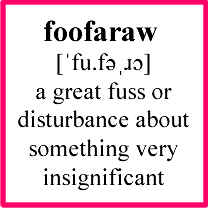
Merriam-Webster defines it as “frills and flashy finery; a disturbance or to-do over a trifle.”
Dictionary.com defines it as “a great fuss or disturbance about something very insignificant; an excessive amount of decoration or ornamentation, as on a piece of clothing, a building, etc.”
According to Wiktionary it means “Overly excessive or flashy ornamentation or decoration; Fuss over something of little importance.” It’s pronounced [ˈfu.fəˌɹɔ], was first used in writing in the 1930s, and is of uncertain origin.
Dictionary.com suggests that it may be related to the French word fanfaron (boasting, boaster), which is either imitative, or could come from Arabic فَرْفَار (farfār), which is possibly the origin of fanfare in French and English. The word fanfaron is an obsolete English word for a bully, boaster or braggart [source].
I might use the word hoo-ha instead of foofaraw. It means “a fuss, uproar, commotion or stir; hype; brouhaha, hullabaloo”, and is also written hoohaa, hoohar, hoo-haa, hoo-har or hoo-hah. It possibly comes from the Yiddish הו־האַ (hu-ha – a hullabaloo) [source].
Do you know other words with a similar mean to foofaraw or hoo-ha?
Today I was looking for podcasts about language and linguistics in various languages, and found an interesting one in Welsh – Hacio’r Iaith (Hacking Language).
The episode I listened to today included the word infestigeiddio (to investigate), which is an interesting example of an English noun that has been made into a Welsh verb. I haven’t seen this word written anywhere – it didn’t appear anywhere online, as far as I can discover, but does now. It is used in the following context:
Mae rhaid i ni rhoi i’r awdurdodau pŵer i infestigeiddio beth sy’n digwydd gyda data, gyda rhifau, gyda metrics hysbysebi, er enghraifft.
This means “We need to give the authorities power to investigate what is happening with data, with figures, with advertising metrics, for example.” It’s part of a discussion about social media sites like Facebook and the data they collect about their users.
There are a few other ways to say investigate in Welsh: ymchwilio, archwilio, astudio, gwneud ymchwiliad, gwneud ymholiad. The common root for most of these is chwilio [ˈχwɪljɔ] (to search, look for, examine, find) [source].
With some words you can just add io to make it a Welsh verb. With others, like investigate, the spelling needs some tweaking as well.
Other similar examples include licio (to like), parcio (to park), pacio (to pack), hwfro (to hoover / vacuum), and smwddio (to iron – from smooth).
Can you recommend interesting podcasts, especially about language and lingusitics, in other languages?
Some words were originally trademarked but have become generic and lost their trademark status. Is there are linguistic term for such words?
Here are some examples that I wasn’t aware were, or are, trademarked:
Can you think of other examples?
Or product names that are becoming generic?
Source: Wikipedia, robdkelly.com

Here’s a recording in a mystery language.
Can you identify the language, and do you know where it’s spoken?

I discovered today that in Romanian a bookworm (a keen reader) is un şoarece de bibliotecă (a library mouse), which I rather like, being a bit of a bookworm / library mouse myself.
In French there is a simliar term for a bookworm – rat de bibliothèque (library rat), and in German voracious reader or bookworm is known as a Leseratte (reading rat), and in Spanish the equivalent is ratón de biblioteca (library mouse).
Are there interesting words for bookworm in other languages?
On an episode of Word of Mouth I listened today, they discuss the associations we have with different fonts.
Studies have found that different fonts can effect the way food tastes to you. For example, the same chocolate can taste sweeter, or less sweet, just because it’s labelled with different fonts.
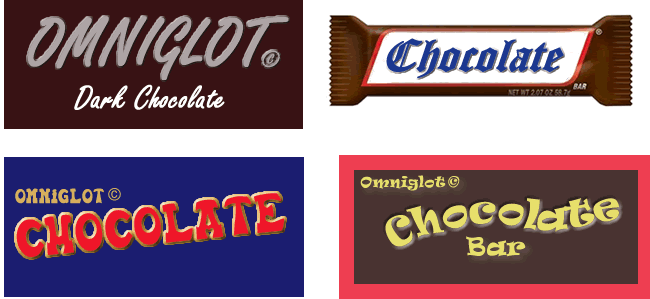
Which of the above would you prefer?
And no, I’m not planning to bring out an Omniglot chocolate bar, in case you’re wondering.
If Greek yoghurt, hummus or other Greek foods are labelled with a Greek-looking font, you may believe that they come from Greece and are more authentic than such products labelled with a different style of font.
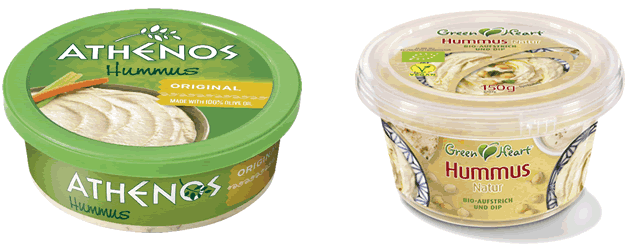
Which of these is most Greek?
Some fonts are seen as more masculine, while others are seen as more feminine.
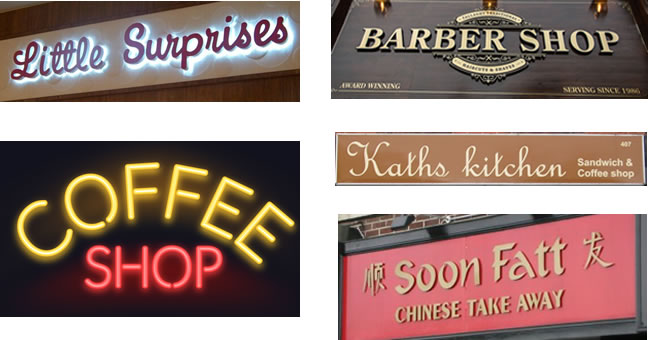
Would you say these shop signs are masculine, feminine or neither?
What are your favourite fonts?
Are there fonts your really don’t like and/or don’t use?

Here’s a recording in a mystery language.
Can you identify the language, and do you know where it’s spoken?
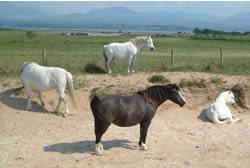
Today I saw a post on Facebook asking why words for horse are so different in languages like English and German, so I thought I’d investigate.
In English horse-related words include horse, stallion (male horse), mare (female horse), foal (young horse), filly (young female horse), colt (young male horse), pony (a small breed of horse), palfrey (a small horse with a smooth, ambling gait) and equine (a horse or horse-like animal; related to horses).
Horse comes from the Middle English horse / hors, from the Old English hors (horse), from the Proto-Germanic *hrussą (horse), from the Proto-Indo-European *ḱr̥sos (horse), from Proto-Indo-European *ḱers- (to run) [source]. This is also the root of the Proto-Celtic word *karros (wagon), from which we get the Latin currus (chariot, wagon), and the English words car, cart and chariot, and related words in other languages.
Stallion comes from the Middle English stalion, from the Middle French estalon and is of Germanic origin [source].
Mare comes from the Middle English mare / mere, from the Old English mere / miere (female horse, mare), from the Proto-Germanic *marhijō (female horse) [source].
Foal comes from the Middle English fole, from the Old English fola, from the Proto-Germanic *fulô, from the Proto-Indo-European *pōlH- (animal young) [source]
Filly comes from the Old Norse fylja [source].
Colt comes from the Old English colt (young donkey, young camel), from the Proto-Germanic *kultaz (plump; stump; thick shape, bulb), from the Proto-Indo-European *gelt- (something round, pregnant belly, child in the womb), from *gel- (to ball up, amass) [source].
Pony comes from the Scots powny, from the Middle French poulenet (little foal), from the Late Latin pullanus (young of an animal), from pullus (foal) [source].
Palfrey comes from the Anglo-Norman palefrei (steed), from the Old French palefroi, from the Late Latin paraverēdus (post horse, spare horse) [source].
Equine comes from the Latin equīnus (of or pertaining to horses), from equus (horse) [source].
The equivalent words in other European languages include:
Germanic languages
| German | Dutch | Danish | Norwegian | Swedish | Icelandic | |
|---|---|---|---|---|---|---|
| horse | Pferd | Paard | hest | hest | häst | hestur |
| stallion | Hengst | hengst | hingst | hingst | hingst | graðhestur |
| mare | Stute | merrie | hoppe | hoppe | sto märr |
hryssa |
| foal | Fohlen | veulen | føl | føll fole |
föl | folald |
The German word Pferd and the Dutch paard come from the Middle High German phert / pherit / pferift (riding horse), from the Old High German pherit / pfarifrit / parafred, from the Late Latin paraverēdus (substitute post horse) [source], from para-, from the Ancient Greek παρά (from, by, near) & verēdus (a fast or light breed of horse), from the Proto-Celtic *uɸorēdos (horse) [source], *uɸo- (under) & *rēdo- (to ride; riding, chariot), from the Proto-Indo-European *(H)reydʰ- (to ride) [source].
The words hengst and hingst come from the Proto-Indo-European *ḱanḱest- / *kankest- (horse), which is also the root of the Welsh, Cornish and Breton words for mare, and of the Old English word for horse or stallion, hengest.
Romance / Italic languages
| French | Italian | Romanian | Spanish | Portuguese | Latin | |
|---|---|---|---|---|---|---|
| horse | cheval | cavallo | cal | caballo | cavalo | equus |
| stallion | étalon | stalone | armăsar | padrillo | garanhão | celo |
| mare | jument | giumenta cavalla |
iapă | yegua | égua | equa |
| foal | poulain | puldero | mânz | potro | potro | equuleus equulus pullus vitulus |
In Latin there was another word for horse – caballus, which was only used in poetry in Classical Latin, and was the normal word for horse in Late and Vulgar Latin. It possibly comes from the Gaulish caballos [source]. This is also the root of the English words cavalry, cavalier, cavalcade and chivalry,
The word equus comes from the Proto-Italic *ekwos, from the Proto-Indo-European *h₁éḱwos (horse) [source].
Celtic languages
| Breton | Cornish | Welsh | Irish | Manx | Scottish Gaelic | |
|---|---|---|---|---|---|---|
| horse | marc’h | margh | ceffyl | capall | cabbyl | each |
| stallion | marc’h | margh | march stalwyn |
stail | collagh grihder |
greadhair |
| mare | kazeg | kasek | caseg | láir | laair | làir |
| foal | ebeul | ebel | ebol | searrach | sharragh | searrach |
The Scottish Gaelic word for horse, each, comes from the
Old Irish ech (horse), from Proto-Celtic *ekʷos (horse), from the Proto-Indo-European *h₁éḱwos (horse), which is also the root of the Breton, Cornish and Welsh words for foal.
The Breton marc’h (horse), the Cornish margh (horse) and the Welsh march (stallion) come from the Proto-Brythonic *marx (horse), from Proto-Celtic *markos (horse), from the Proto-Indo-European *márkos (horse). [source]. This is also the root of the Irish marcaigh (to ride), the Scottish Gaelic marcaich (to ride), and the Manx markiagh (to ride).
You can find more about Celtic words for horse on my Celtiadur blog
Slavic languages
| Bulgarian | Czech | Polish | Russian | Serbian | Slovak | |
|---|---|---|---|---|---|---|
| horse | кон | kůň | kón konno |
лошадь | коњ | kôň |
| stallion | жребец | hřebec | ogier rumak |
конь жеребец |
жребец | žrebec |
| mare | кобила | klisna | klacz kobyła |
кобыла | кобила | kobyla |
| foal | жребец | hříbě | źrebak | жеребёнок | фоал | žriebä |
The Russian word for horse, лошадь, is a borrowing from a Turkic language, probably Tatar [source].
The other Slavic words for horse come from the Proto-Slavic konjь (horse), of unceratin origin [source].
Other European languages
| Latvian | Lithuanian | Albanian | Greek | |
|---|---|---|---|---|
| horse | zirgs | arklys | kalë | άλογο ίππος |
| stallion | ērze | erelis | hamshor | επιβήτορα |
| mare | ķēve | kumelė | merak | φοράδα |
| foal | kumeļi | kumeliukas | pjellë | πουλάρι |
Sources: Reverso, Linguee, bab.la, Google Translate
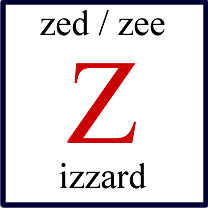
The letter Z is known as zed [zɛd] in the UK, Canada, India, Ireland, New Zealand, and Australia, and as zee [ziː] in American English.
The name zed comes from the Greek name for the letter Ζ ζ zeta (ζήτα). The name zee is comes from an English dialectal form of the 17th century, and rhymes with other letter names, like bee, cee, dee, etc.
Another dialectal name for this letter from the 18th century is izzard [ˈɪzərd], which possibly comes from the Occitan izèda or the French ézed.
The letter Z has had a number of different forms in different alphabets:

It’s origins can be traced back to an Egyptian Hieroglyph which looked like the Proto-Sinaitic version, which meant sword or weapon.
Names for the letter Z in other languages include:
Sources: Wikipedia and Wiktionary
What do you call this letter?